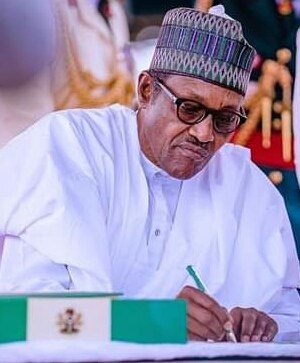
NIGERIA’s gas development got a huge boost on Tuesday with the turning of sod of the $2.92 billion Ajaokuta-Abuja-Kaduna-Kano (AKK) Gas Pipeline.
President Muhammadu Buhari performed the sod turning that is expected to be completed in 24 months, virtually from Aso Villa.
On completion, the project is conceived to transport gas through the pipeline and sub-stations to Kogi, Niger, Kaduna, Kano states and the Federal Capital Territory, pushing dry gas from the nation’s rich gas fields in the Niger Delta to the North.
The AKK is part of an ambitious pipeline project designed to supply gas to Europe through the proposed Trans Sahara Gas Pipeline (TSGO), as well as the Nigeria Morocco Gas Pipelines.
The “gas penetration” to these areas will significantly reduce energy cost for industries along the pipeline corridor in addition to the massive generation of employment during and after the construction.
Buhari said Nigeria is committed to the timely delivery of the project.
He urged the partners in the project, including the Nigerian National Petroleum Corporation (NNPC), to keep focus on the target. He reminded them that the AKK project was key to the sustainable development, enhancement of economic prosperity and increase of the country’s infrastructure assets.
Buhari, who watched remotely via video-conference from the Council Chambers of the State House, told the governors of Kogi and Kaduna states; Alhaji Yahaya Bello and Nasir El-Rufai (who were present at the two sites) that “ the project must succeed as it is very dear to the people of Nigeria.”
He said: “We promised the nation that we will expand the critical gas infrastructure in the country to promote the use of gas in the domestic market. These include the Escravos to Lagos Pipeline System – 2 (ELPS-2), Obiafu to Obrikom (OB3) pipeline and AKK. These projects are fundamental to our desire to industrialize and energise the entrepreneurial spirit that is ever present in our population.”
He listed some of the project’s benefits to include provision of gas for generation of power and for gas-based industries which would facilitate the development of new industries.It will also ensure the revival of moribund industries along transit towns in Kogi State, Abuja (FCT), Niger State, Kaduna State and Kano State, adding that the cascading effect and impact of the AKK, when operational, will be immeasurable.
He said: ‘‘It has significant job creation potential both direct and indirect, while fostering the development and utilisation of local skills and manpower, technology transfer and promotion of local manufacturing.’’
Buhari said Nigeria has learnt invaluable lessons from the global COVID-19 pandemic and some oil rich countries that have used their crude as a pathway to economic and industrial diversification.
On COVID-19, the President said the pandemic had further underscored the drive of his administration for export substitution initiatives and projects that promote local manufacturing.
On diversification, the President said: ‘‘Gulf countries that have similar levels of gas reserves as Nigeria, have a strategy centered around gas-industrialisation as their foundation towards export diversification. This has to be our guiding principle as we seek to attract investment and create opportunities for our people.’’
The President challenged the private sector to lead the charge in maximising the nation’s gas resources.
According to him the private sector can create a petrochemical hub that will resurrect the manufacturing industry and put the nation on the path to increased self-sufficiency.
‘‘As the world evolves, we owe our people the responsibility to prepare them for what the future holds. We, therefore, must be bold and fearless and can no longer be incremental in our approach.
‘‘Time is short, and our people’s zeal is strong and palpable. Infrastructure development although long, tedious and complex remains a cardinal objective of our Administration’s drive towards ensuring a stable, sustainable and more prosperous future for our citizenry.
‘‘Today marks an important chapter in the history of our great Nation. It marks the day when our domestic natural gas pipeline networks; from Obiafu in Rivers State, Escravos in Delta State and Lekki in Lagos State, are being connected through Kaduna to Kano States thereby enhancing national energy security, creating balanced development, and further integrating our nation,’’ he said.
Group Managing Director (NNPC) Mallam Mele Kyari, explained that the AKK gas pipeline project, which is part of the Trans-Nigeria gas pipeline project, involves the establishment of a connecting gas pipeline network that will integrate the Northern region of the country with the Niger Delta, Eastern and Western regions.
He said the EPC contract for the 614km AKK gas pipeline project was awarded at a total contract sum of US$2.592 billion to Messrs. Oilserv Plc/China First Highway Engineering Company (Oilserv/CFHEC Consortium) for the first segment covering 303km.
Kyari said, Messrs. Brentex Petroleum Services/China Petroleum Pipeline Bureau (Brentex/CPP Consortium) got the contract for the second segment covering 311km under a debt-equity financing model with loan from Bank of China and SINOSURE, to be repaid through the pipeline transmission tariff and supported by a sovereign guarantee.
‘‘We are confident that the EPC contractors will deliver the project on time, within budget and to quality/specifications,’’ he said, adding that upon completion, the project would enable the injection of 2.2bscf/d of gas into the domestic market and facilitate additional power generation capacity of 3,600MW.
Speaking at the Kaduna site, Minister of State for Petroleum Resources, Chief Timipre Sylva, noted that the AKK project was expected to give room for the growth of some petro-allied companies in the northern axis of the country.













